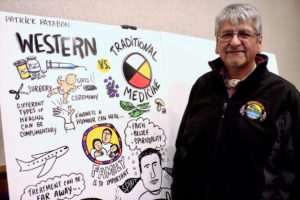Long Lake #58 councillor shares his healing journey with traditional and western medicines

By Rick Garrick
THUNDER BAY — Long Lake #58 Councillor Patrick Patabon spoke about how traditional and western medicines can be used together during his Western vs Traditional Medicines, a Personal Perspective presentation at the Matawa Health Co-op Health Forum.
“Summing up, my presentation is how we could incorporate and use the traditional and western [medicines], using it together to better ourselves,” says Patabon, who described his healing journey from cancer and his grandson’s healing journey after being born with a serious medical condition during his Feb. 6 presentation. “They both work, because I’ve experienced that myself personally with my grandson and myself and with our family. They both could work together as long as you have that faith and belief and that value.”
Patabon, a Native Addictions Drug and Alcohol Program worker in Long Lake #58, also spoke about how his community has brought in traditional healers four times a year for about five to six years to help Long Lake #58 citizens and other people from the area.
“In the beginning, we had maybe 10-15 people; now they’re seeing on average 50-60 people,” Patabon says. “We’re open to whoever wants to come, any walks of life — the door is open. So we get visitors from Geraldton, Nakina, Ginoogaming, different places. Depending on what people are there for, some [visits] could run from half an hour to an hour and a half. But they take the time to sit down and talk and go through the process with the individual and their families.”
Patabon says Long Lake #58 now gets phone calls from people who want to know when the traditional healers will be in the community.
“So people are seeking out and wanting more of this way of life,” Patabon says.
Patabon says he was introduced to the traditional way of life at the Pritchard House Treatment Program in Winnipeg when he decided to quit using alcohol and drugs after waking up in a back alley in Winnipeg on a Sunday morning in 1986.
“That’s where my healing journey started,” Patabon says. “That’s where I was introduced to the Anishinaabe way of life because they did ceremonies in there.”
The Matawa Health Co-op Health Forum, which focused on Re-claiming and Strengthening Our Health Care, also featured a Success Story presentation by Sterling Finlayson, a Long Lake #58 citizen and recent Confederation College graduate.
“Working on myself was the biggest thing,” Finlayson says, noting he learned to forgive people in his past. “I had to forgive others in order for me to move forward in order for me to be successful. I had to forgive myself for doing those things. A million people can forgive me, but if I don’t forgive myself those million forgiveness, they don’t mean nothing.”
The forum, held Feb. 4-6 at the Valhalla Inn in Thunder Bay, also featured a keynote address by Kendal Netmaker, an overview of services by Matawa Health Cooperative executive director Frances Wesley and a From Inter-generational Trauma to Inter-generational Healing presentation by forum emcee Corey Wesley on Feb. 4.
Other presentations included a Feb. 5 presentation on Nishnawbe Aski Nation Health Transformation by former National Chief Ovide Mercredi, the lead negotiator with Nishnawbe Aski Nation, and a Feb. 6 presentation on Indigenous Midwifery by Lisa Bishop, a Wiikwemkoong citizen who works with Dilico Anishinabek Family Care in Thunder Bay.


